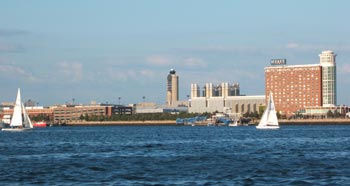As I set off for Japan and Korea I was eagerly looking forward to my first ChemComm symposium as Editor. At Heathrow I met up with Dr Luet Wong (University of Oxford), a speaker at the symposium, and the long trip to Osaka began (made even longer by a one hour delay for refuelling as we sat on the plane).
On arrival in Japan, the weather was grim, with low cloud and heavy rain – just what you need after a 12 hour flight. But on the plus side, the three hour journey from Tokyo to Osaka on the Bullet train was super efficient and on time to the second…just the Japanese way.
In Osaka it continued to rain contrary to the weather predictions. The hotel is fine; however, it amazes me, when WiFi is available in all McDonalds around the world, that a Sheraton hotel in a major city can not provide such a service.
Jet lag kicking in, we ventured out for dinner. With much choice, but everything in Japanese, the easy way is to just look at the pictures and plastic replicas. Despite the availability of a variety of Japanese restaurants, our final selection was a Chinese restaurant on the 12 floor of a department store. The food was great but after choosing a bottle of Chateau Bel Air, (from France and not Beverley Hills), the chilled glasses were sent back for room temperature equivalents. Alas, the wine was ice cold when delivered!
The final course of the meal was duck: four pieces of duck, enough for two, absolutely…. Unfortunately not, four pieces of duck skin, beautifully mounted on individual prawn crackers, great value at 2700 Yen (about £20).
Despite the duck, it was an excellent meal. Sensibly I retired to bed early in anticipation of a packed first day of stimulating lectures ahead…..













 On Monday I attended the
On Monday I attended the 


